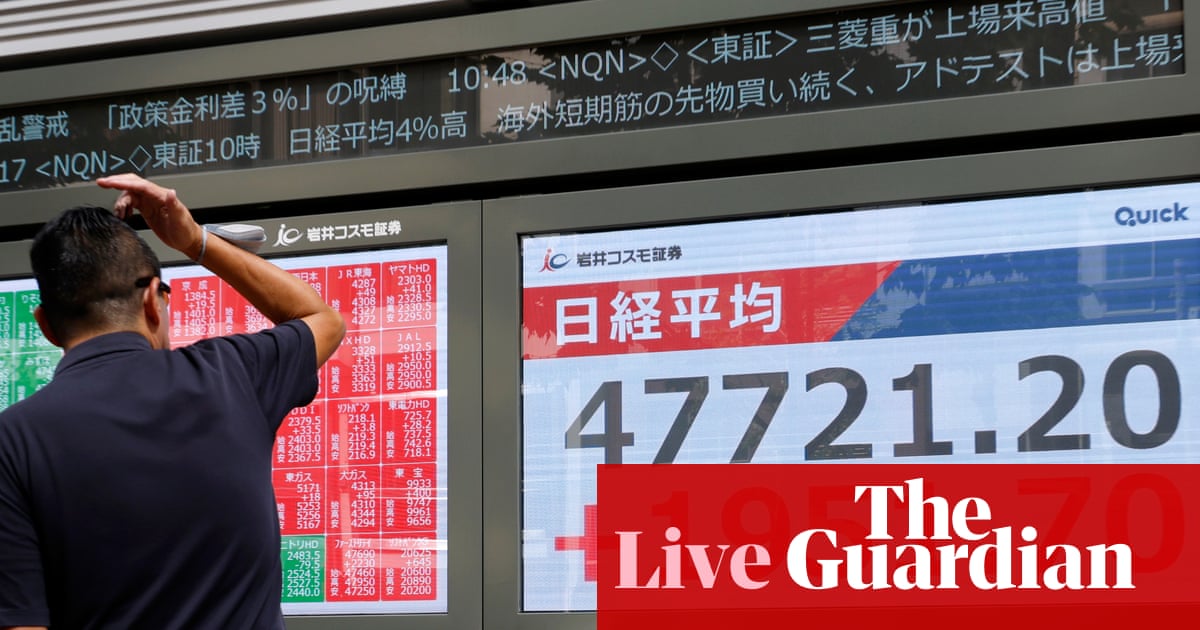Key events
Aston Martin shares slump after tariffs profits warning
Shares in luxury carmaker Aston Martin have tumbled at the start of trading after it issued a profits warning this morning.
Aston Martin blamed “the heightened challenges in the global macroeconomic environment, including the ongoing impact of tariffs,” as it told investors that sales and earnings would be below expectations this year.
Aston Martin even cited the recent hack at rival Jaguar Land Rover, saying:
The global macroeconomic environment facing the industry remains challenging.
This includes uncertainties over the economic impact from U.S. tariffs and the implementation of the quota mechanism, changes to China’s ultra-luxury car taxes and the increased potential for supply chain pressures, particularly following the recent cyber incident at a major UK automotive manufacturer.
The company now expects its total wholesale volumes this financial year to decline by mid-high single digit percentage when compared to the previous 12 months.
Profits this year will also probably slink in below expectations, Aston Martin adds, explaining:
Management has initiated an immediate review of future cost and capital expenditure but not withstanding this now expects FY 2025 adjusted EBIT to be below the lower end of the range of market consensus (consensus adjusted EBIT low end: £(110)m) and no longer expects positive free cash flow generation in H2 2025.
Shares fell 11% at the start of trading, and are now down 7.4%.
There’s good news for the UK’s stock market this morning – British bank Shawbrook is planning an initial public offering in London.
Shawbrook has announced that it intends to float its shares on the Main Market of the London Stock Exchange, to fund its growth plans and boost its “profile and brand recognition” in the UK.
The float will also allow Shawbrook’s existing sole shareholder, Marlin Bidco Limited, to realise part of its investment in the bank
Marcelino Castrillo, CEO of Shawbrook, told the City this morning:
“When Shawbrook was founded, we saw that large parts of the UK economy were unable to access the capital needed to grow. Since then, we have created a scaled and diversified banking platform, combining next generation technology with deep human expertise, that makes us uniquely placed to provide our customers with the flexibility, speed and certainty they need.
“The strength of our platform has enabled us to deliver a long track record of sustainable, profitable growth through a wide variety of macro conditions. We have transformed the size of our loan book as we’ve won share, entered new markets and expanded our capabilities through strategic acquisitions; we have built a trusted and attractive savings proposition that provides us with a stable and scalable funding base; and the significant investment in our digital platform provides excellent risk management capabilities and strong operating leverage.
“Looking ahead, we are as excited as we have ever been. We have achieved real scale, and our current markets are large and growing, supported by attractive tailwinds. We also see a significant opportunity to bring Shawbrook’s offering to new types of customers. The entrepreneurial spirit that has driven our growth remains at the heart of how we operate and we have ambitious plans for the future. An IPO would mark an important milestone in our journey.”
Shawbrook said it intends to sell shares to retail and institutional investors and will have a free float of at least 10%. It also expects to be eligible for inclusion in London’s FTSE indices.
Bloomberg has reported that Shawbrook could be valued at £2bn, which would qualify for the FTSE 250 index of medium-sized companies.
Currency strategists at Deutsche Bank and Goldman Sachs have closed their recommendations to hold a long position on the Japanese yen after the country’s ruling party picked Sanae Takaichi as its head, sending the currency slumping.
In a note titled “Getting out of the yen”, Deutsche Bank’s global head of FX research George Saravelos explained:
We went long JPY in our FX Blueprint but are now getting out following the LDP election outcome this weekend. Sanae Takaichi’s surprise victory reintroduces too much uncertainty around Japan’s policy priorities and the timing of the BoJ [Bank of Japan] hiking cycle.
There is agreement that inflation is a problem in Japan, but uncertainty is now going up again on how it will be dealt with
Saravelos also warned that signs of fiscal dominance in Japan (where the government controls the central bank’s actions) are a tail risk.
Gold closing in on $4,000/oz record
The gold prices is hitting fresh record highs, again, today, in its strongest year since 1979.
The spot price of bullion has jumped by over 1% today to $3,944 per ounce, as it closes in on the $4000/oz mark.
This means the gold price has jumped by 50% since the start of January, on track for its best annual gains since the Iranian Revolution.
Gold has been driven higher this year by several factors, including rising concerns that government debts are unsustainable.
Sanae Takaichi’s election win in Japan will only have reinforced concerns that politicians will attempt to secure growth through higher borrowing and lower interest rates, and rely on inflation to erode the value of the resulting debt.
Introduction: Yen slumps, Nikkei hits record after Takaichi win Japan’s leadership election
Good morning, and welcome to our rolling coverage of business, the financial markets and the world economy.
Japan’s stock market has surged to a record high today, while the yen is plunging, after the leadership of the country’s ruling party was surprisingly won by fiscal dove Sanae Takaichi.
Predictions that Takaichi will be a pro-stimulus prime minister has sparked a wave of enthusiastic buying has pushed the Nikkei 225 share index up by 5%, as it gained 2315 points to close at 48,085.
But the yen is very much moving in the other direction – it’s down almost 2% against the US dollar at 150.3¥/$.
Takaichi, who should become Japan’s first female prime minister later this month, is a long-time admirer of Margaret Thatcher. But although she is conservative on social policy, Takaichi takes an un-Thatcherite approach to fiscal policy, and has advocate a revival of government spending and loose monetary policy.
As such, she’s expected to continue Japan’s push to stimulate its economy though fiscal spending and lower interest rates, which would lead to higher inflation and increased borrowing.
Thus the weaker yen, as investors anticipate fewer interest rates hikes in Tokyo than before.
Japanese long-term bond prices have also fallen today, pushing up the yield on its 30-year debt near to record highs, on expectations of higher borrowing and more persistent inflation.
The markets will be calculating how closely Takaichi’s plans will resemble the “Abenomics” programme pushed by former PM Shinzo Abe.
Chris Weston of brokerage Pepperstone explains:
Unlike in late 2024, Takaichi has refrained from talking up Abenomics in this LDP leadership campaign, but most know her underlying stance and her appreciation of Shinzo Abe’s Three Arrows philosophy.
Traders may therefore move to obtain clarity on that position, as well as exactly how influential she may be in shaping the BoJ’s policy thinking, given the October BoJ meeting is seen as a “live” affair and a 25bp hike seen as a real possibility…
The agenda
-
8.30am BST: Eurozone construction PMI for September
-
9.30am BST: UK construction PMI for September
-
6.30pm BST: Bank of England governor Andrew Bailey to give keynote speech at Scotland’s Global Investment Summit 2025









